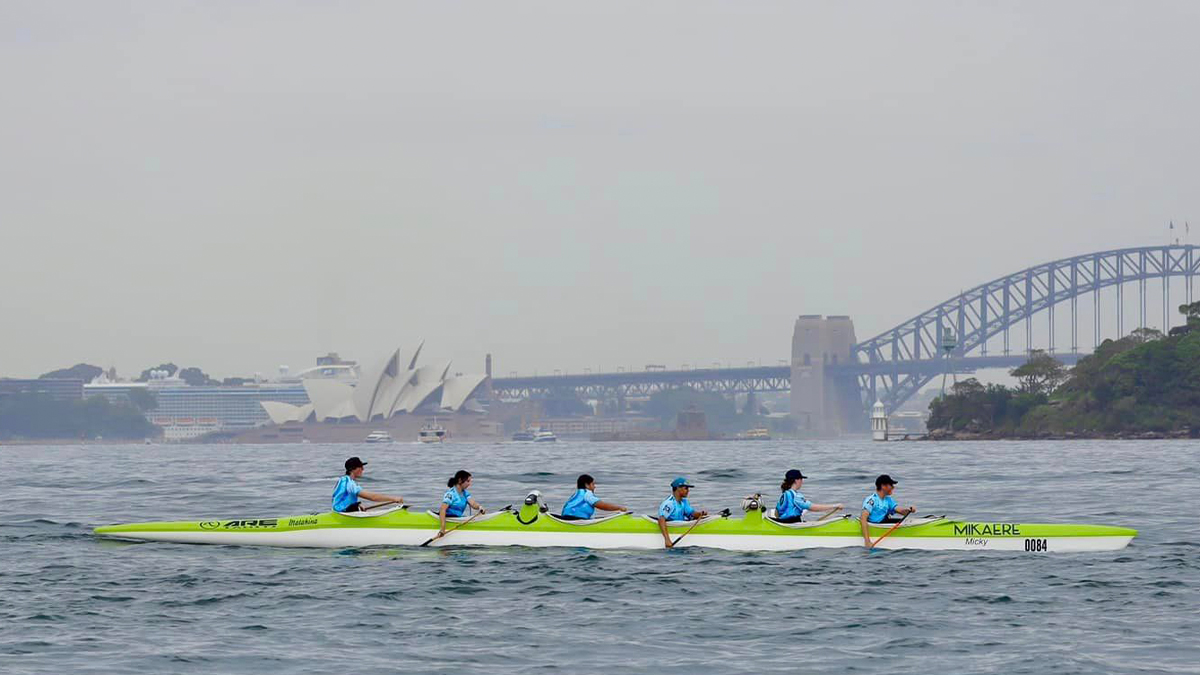
The Scientia Senior Lecturer says her connection to nature is important for managing her mental health.
Last Saturday (2 March), the School of Built Environment’s Dr Negin Nazarian took part in a 23-kilometre outrigger canoe race, the Sydney Harbour Challenge. It’s her sixth year in the Challenge, and this time they paddled from Rose Bay on the Harbour, around South Head to Dover Heights and back again.
Negin says the ocean is her passion and something she feels “very connected to”.
“I'm really a city person, but I get my energy from nature, and specifically the ocean and the mountains. I do a lot of ocean swims, I hike, I dive and I canoe, usually at La Perouse.

“Racing is intense, but it keeps me sane. It’s a really nice way of disconnecting from the day-to-day life, connecting with nature – and connection to nature and the environment circles back to the work I do.”
Negin has also participated in a number of international races, paddling around Hong Kong Harbour, in Singapore, New Zealand and various locations in the US.
From surfing to climate science
Negin’s (academic) family moved to Australia more than 20 years ago from Iran. She studied mechanical engineering and got a scholarship to the University of California, San Diego, and its beachside campus in La Jolla. Her love of surfing then drew her to choose a course called Introduction to Climate Science in the first term of her Master’s and, she says, she “was hooked”.
“I have always been interested in applied research that can shift the way we do things, which is how I became interested in looking at climate in cities. So, then I did a post doc in architecture at MIT,” Negin says.
A traveller with a love of languages
Travelling is another passion for Negin, drawn to exploring diverse cultures that help us reevaluate our ideologies and ways of life. Having visited more than 50 countries, some quite “remote”, she continually seeks out new experiences and perspectives.
“I have been to several countries – including Mozambique, Rwanda, Ethiopia, and Tanzania – in Africa, Galapagos in South America, hiked and sailed all over Asia, and I am going to Antarctica next January with the Homeward Bound women in STEMM leadership program.”
She says she is “comfortable” in four languages – bilingual in English and Farsi, fluent in Spanish and French, and can understand and read Arabic.
Managing mental health
Negin says that at universities, we generally focus on everyone’s accomplishments, but on a more personal level, she is really proud of how well she manages her mental health.
“I have been very privileged in a lot of aspects of my life, but I have also dealt with anxiety. Juggling things and seeking perfection comes at a cost, and I think it’s important to recognise that a certain level of success can bring mental health challenges,” Negin says.
“I have become really good at managing those things – and a lot of the activities I do are helping me navigate those challenges. You can also see from my bookshelves that there are a lot of books about understanding your psychology and philosophy of life, and they have been incredibly important to me in navigating my mental health.”
What is the best advice you ever received?
As a young woman of colour, I navigate the complexities of intersectionality in diversity. Through advice from several mentors, I’ve learned to recognise these barriers but refuse to be defined by them. Instead, the best advice has been to reframe them as sources of strength and resilience, and continue being resourceful – and very often, this means not taking ‘no’ for an answer.
What makes you happy?
Connection - to nature and people.
What is the best thing you have read in the last year?
I am a voracious reader. Luckily, I have an app to keep track of the books I’ve read and to rate them. There are a few with five stars but the most memorable is Braiding Sweetgrass by Native American botanist Robin Wall Kimmerer.
Do you know someone with a good story? Email us at insideUNSW@unsw.edu.au
- Log in to post comments
